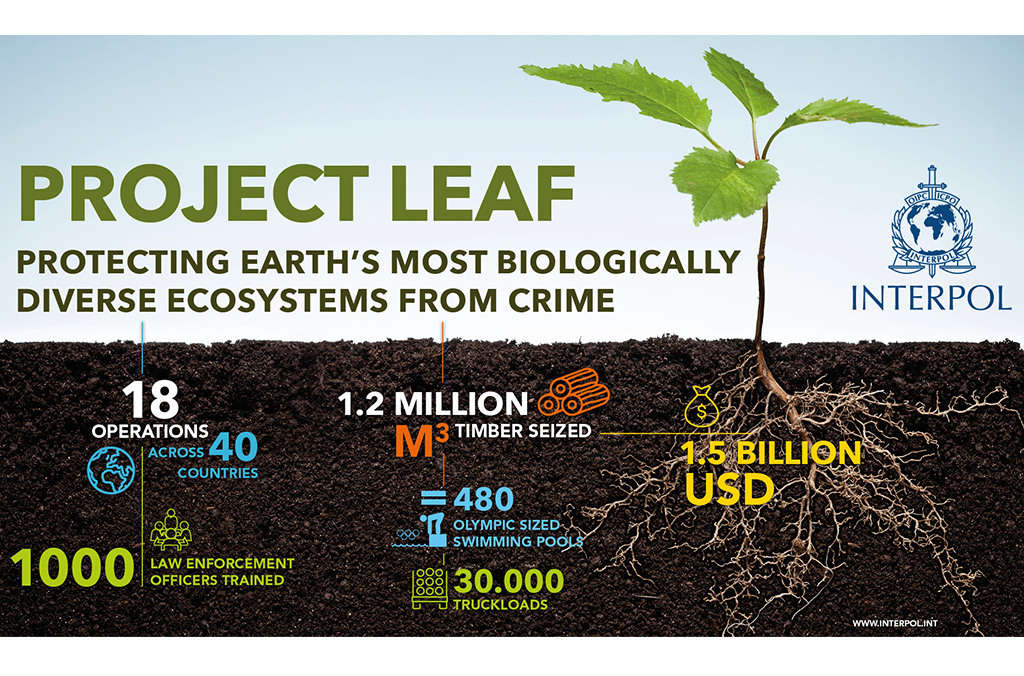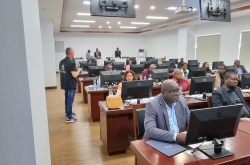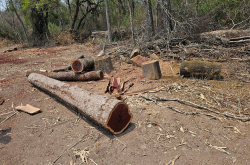LYON, France – Every 21 March, INTERPOL marks International Forest Day by highlighting how the global police community tackles forestry crime as part of steps to make the world a safer place.
INTERPOL operations to date have resulted in the seizure of more than 1 million cubic metres of illicit timber (worth in excess of USD 1.5 billion) across Africa, Asia, Europe and Latin America.
Training of financial intelligence units has led to millions of dollars in assets being seized from illegal logging networks and returned to state budgets.
A day to raise awareness
Illegal deforestation is a threat of global proportions which continues to develop at an alarming rate. 13 million hectares of forest are destroyed each year, accounting for 20% of the global greenhouse gas emissions that contribute to climate crisis.
Experts believe that organized criminals make more than USD 150 billion a year by illegally cutting down tropical forests, which prevents sustainable economic development in rainforest nations and has a major impact on the global climate.
The same routes used to smuggle illegal timber across countries and continents are often used to traffic weapons, drugs and people, frequently occurring hand in hand with other offences such as document fraud, corruption, money laundering, violence and intimidation, and even murder.
Human encroachment into forested areas, driven by illegal logging, agricultural expansion and illegal mining, is increasing human contact with wildlife’s infectious diseases.
What is INTERPOL doing about it?
INTERPOL’s forestry crime teams help police work across the timber supply chain to disrupt criminal networks and the financial flows that facilitate forestry crime. They help countries identify new trends, share intelligence and work together on cross-border operations and investigations into forestry crime.
The teams also develop the ability of countries in all regions to sustainably manage their natural resources and target organized criminal groups involved in forestry crime by facilitating the sharing of information throughout the global enforcement community.
INTERPOL publishes orange notices warning of an event, person, object or process that represents a serious and imminent threat to public safety. An orange notice can ask countries to identify potential illegal logging practices with high risk of spreading disease or infestation, such as timber shipments infested with insects that risk spreading to other countries.
INTERPOL also publishes Red Notices to assist countries track down and apprehend wanted fugitives for offences related to forestry crime.

Protecting forests for a safer world
As humans clear forests on a massive scale they run the risk of driving the transmission of infectious diseases, particularly when new habitats draw disease-carrying species out of the forest.
Many viruses exist harmlessly with their host animals in forests, because the animals have co-evolved with them. Humans can become unwitting hosts for pathogens when they venture into or change forest habitat.
Around 1.6 billion people depend on forests for their livelihoods, medicines, fuel, food and shelter. Helping the world conserve the environment also contributes towards protecting health.
INTERPOL’s global forestry crime teams coordinate a global law enforcement response to protect the world’s forests with the financial support of Norway and the US, the European Union, and in a close collaboration with the United Nations and other international organizations.
FORESTS AND BIODIVERSITY
Too precious to lose
#IntlForestDay
Related news

Border security threats focus of STOP operations in Africa
8 December 2023










